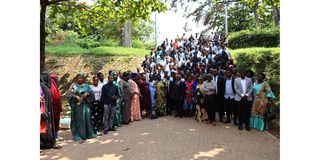Catalysing the future of education through corporate giving

The refugee community that trained in entrepreneurship with some of the Makerere University officials at Makerere University. PHOTO | NOELINE NABUKENYA
What you need to know:
- Scholarships significantly contribute to students’ success, and corporate philanthropy contributes considerably to this. Looking back to the era of Kenyan educational airlifts in the 1960s, which gave birth to some of our country’s best minds, we can be inspired to continue in the same vein, incorporating education into our corporate giving.
Each year, we observe International Day of Education. 2024 is no different, and the theme for this year is “Learning for Lasting Peace”.
It is important to note that schools are more than just learning institutions. They are wellsprings of camaraderie, centres for mental and physical health development, a place to obtain healthy nutrition and the perfect environment for positive character building.
Africa has had varied histories of peace and conflict through local, civil, and international disputes. The need for more aggressive education programmes to drive development and teach younger generations a deep sense of cohesion, which will contribute to peace and stability, has emerged in recent decades as our populations get younger.
Further, a population is less likely to be incited to take up arms when skilled and engaged in commerce and industry.
Education can become a foremost agent for peace when learning curriculum frameworks are developed with equality, inclusivity, fairness, and openness at their core.
Conversely, the effects of conflict on education are apparent. According to the Global Peace Index 2023, the average level of global peacefulness deteriorated for the 13th time in the last 15 years, with 2022 recorded as the deadliest year due to the Covid-19 pandemic since the Rwandan Genocide in 1994.
In the wake of significant conflict, education facilities and systems are among the first to face disruption, and recovery is never easy, even in post-conflict scenarios.
No one can ever predict the beginning or end of such crises, and it is essential to intervene with measures that enable the continuity of educational services in the face of such disruption.
Scholarships significantly contribute to students’ success, and corporate philanthropy contributes considerably to this. Looking back to the era of Kenyan educational airlifts in the 1960s, which gave birth to some of our country’s best minds, we can be inspired to continue in the same vein, incorporating education into our corporate giving.
The success stories of these students and many others across the country who benefit from scholarships are a testament to the fact that there remains a considerable gap in financing education.
At the tertiary and university level, statistics from the National Treasury’s Education Sector Report of 2022 compares FY 2019/20 to FY 2021/22, showing that overall enrolment in Public TVET institutions increased from 217,017 to 297,505 in the respective periods.
There was increased enrolment at the university level for the same period: from 568,653 to 620,480, representing a 9 percent growth.
The funding is significant in this period, with the number of undergraduate students who received loans in universities at 243,084 in FY 2019/20, decreasing to 229,727 in FY 2020/21. However, the number increased to 244,552 post-pandemic in FY 2021/22.
The report recommends the enhancement of collaborations in global citizenship and peace education for the prevention of threats to the welfare and security of children.
The responsibility to deliver quality and inclusive education for more integrated and peaceful societies cannot be left to governments alone. Non-state stakeholders, too, must answer the rallying call and invest in education.
As corporations, it is to our benefit that we play our part in creating a transformative learning experience, equipping learners with essential knowledge, values, attitudes, skills, and behaviors to emerge as catalysts for peace within their communities.
After all, this is the future workforce, and unless we make inputs to their development and the stability of our operating environments, our survival is also at risk.
Mr James Gatere is the Head of the I&M Foundation.




